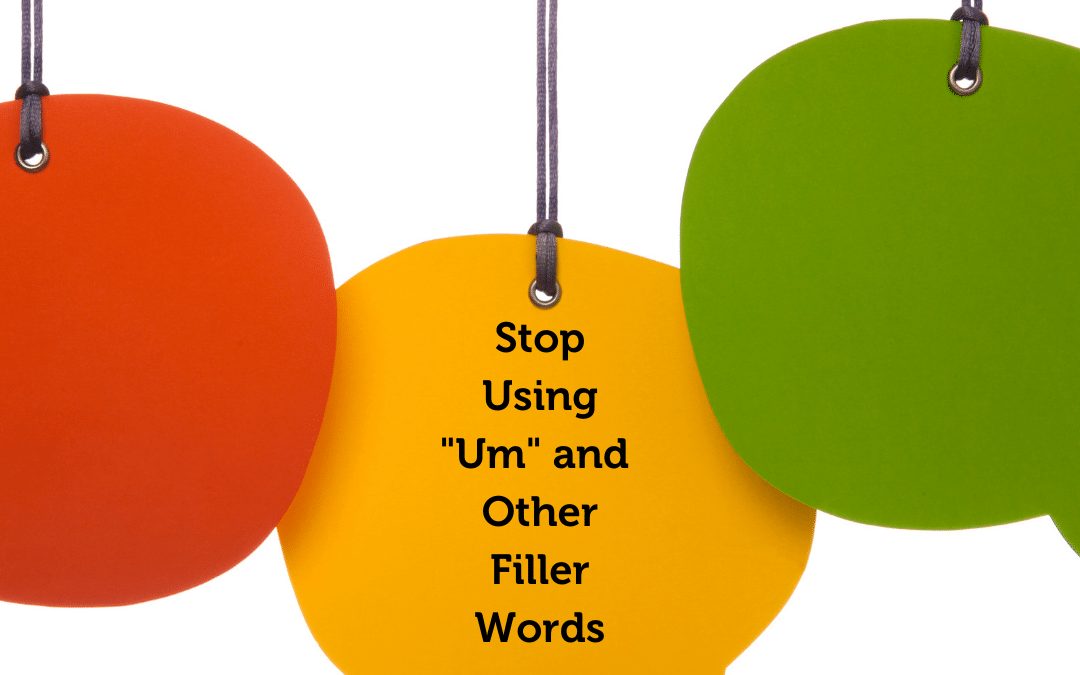
Lately, I’ve been coaching leaders on developing their presentation skills. In particular, the focus involves role playing using behaviour-based interview questions.
In a typical coaching session of this nature, I provide my client with a brief workplace challenge and then ask them four to six thought-provoking questions. This part of the session takes between 30-35 minutes and the remainder of our hour together involves client self-reflection and coach feedback.
Um, Uh, So and Other Filler Words
One area that repeatedly surfaces is the use of filler words. Commonly used filler words are “uh”, “um”, “so”, “uh-huh”, “really”, “man”, and “right”.
When you answer a question, do you know what, if any, filler words you use?
You may be shocked to find out what and how often filler words appear in your speech.
Verbal Stumbling
When filler words are used occasionally, it is no big deal, but when they are used repeatedly, it makes you look less confident, less professional, and less articulate. Additionally, filler words are annoying to hear and cause your audience to work harder to capture the essence of what you are trying to say.
Break the Filler Word Habit
Back in the 1980s there was a PSA with G.I. Joe who said, “Knowing is half the battle”. It was created to help educate children about avoiding unintentionally dangerous behaviour like playing with fire or running into traffic or these days, looking at your smartphone while crossing an intersection.
While cognitive awareness is helpful, it doesn’t change behaviour. You need to want to make change happen.
You need to watch yourself and listen for the word fillers.
Over the years, I’ve had plenty of opportunity to watch and listen to recordings of interviews I’ve conducted on local television and radio. Additionally, all the coach training classes I instruct are recorded too.
Tips and Free Resources
Even if you don’t have these opportunities for self-reflection and feedback, try the following tips to start breaking the filler word habit.
- Listen to Yourself Speak. Make a recording of a Zoom, Microsoft Teams, or other digital based meeting. If you are on the call yourself – record it.
Here are three questions you ask and answer yourself in your recording:
a) What do you like best about the work you do?
b) What would you like to start doing more of that you don’t make time for now?
c) What would you like to stop doing that is stealing joy from your life?
These are great coaching questions to facilitate greater self-awareness too! - Allow for a Slight Pause. It is okay to take a few seconds to consider your response and gather your thoughts. Often, we use a filler word so there is no silence. By giving yourself permission to create space in your speech to think and reflect on your choice of words, you will start the process of eliminating filler words from your speech.
An important by-product is that you will unconsciously help others feel safe to use silence as well. You might even help someone else reduce their use of filler words. A win-win, don’t you think? - Take a Few Deep Breaths. Before you speak, try some calming grounding and deep breathing techniques to help you calm any nervousness you may be feeling. It takes less than a minute and as long as it isn’t distracting or too obvious, it can become a highly effective calming exercise. Try this 30-second calming breath bubble exercise or this one by Calm.com (with no sound) to test it out.
- Practice and be Patient. Developing a new skill or breaking a habit takes time, energy, patience, and practice. Like strength training or other skills development, you are not going to be perfect or super-skilled at it right away.
You might find that watching yourself feels uncomfortable and you would rather avoid it. Look at yourself as a third-party observer and a coach. What kind of encouragement will you provide? Negative self-talk and criticism won’t help you stop using filler words. Patience and self-compassion will win the day. - Try out Presenter Coach in PowerPoint. Another tool I use is a free feature in PowerPoint. It is the Called “Presenter Coach” and it is used most often to help with rehearsing a slide show. Without having anyone else watch you and provide feedback, Presenter Coach gives you feedback via a report on your use of filler words, your euphemisms and even – and this is awesome – culturally sensitive words. It also lets you know about your pace and tone. By using Presenter Coach, I was surprised to learn that I overuse the word “really”. I continue to work on applying this feedback, really.
- Apply Chunking Your Thoughts Using the Power of Three. In media training, it is common to consider a response by chunking it into three sections. Often, we see this in action in a news interview or media report where an expert provides an answer by applying a past, present, and future perspective.
When you take a few seconds to gather your thoughts and then chunk or break down your answer into groups of three, it can help you avoid rambling or disjointed responses. Chunking in threes gives you a rhythm and pace that feels manageable and with practice, it gets easier to do with less conscious effort.
Need a Bit More Help?
Try experimenting with these and other tips and soon you will have broken the filler word habit. It takes time but makes a huge difference in the impression you make, how confidently you come across to others, and could help you nail your next dream job interview. If you feel you need a bit more help or would like to chat about other career enhancing skills, please contact me at [email protected].



